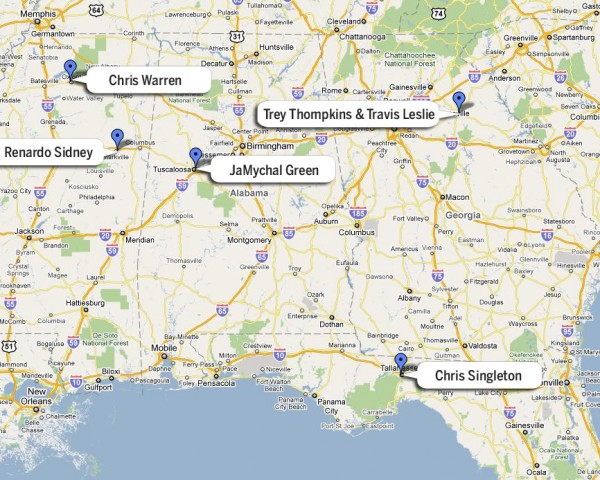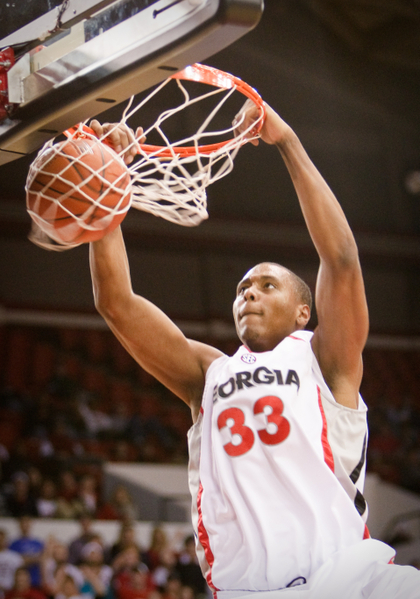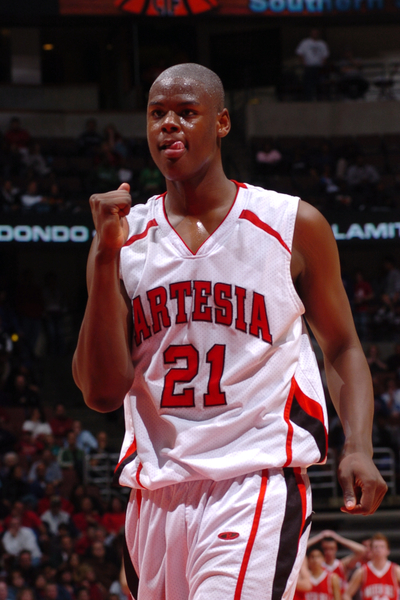RTC 2010-11 Impact Players – Deep South Region
Posted by rtmsf on October 14th, 2010It’s October. The leaves are starting to turn colors. Halloween candy is already in the stores. There have been a few nights where you may have even turned on the heat. Midnight Madness is imminent and RTC is full bore into the 2010-11 Season Preview materials headfirst. For the second October in a row, we’re bringing you our RTC Impact Players series. The braintrust has gone back and forth on this and we’ve finally settled on a group of sixty players throughout ten geographic regions of the country (five starters plus a sixth man) to represent the who and where of players you should be watching this season. Seriously, if you haven’t seen every one of these players ball at least once by the end of February, then you need to figure out a way to get a better television package. As always in a subjective analysis such as this, some of our decisions were difficult; many others were quite easy. What we can say without reservation is that there is great talent in every corner of this nation of ours, and we’ll do our best to excavate it over the next five weeks in this series that will publish on Mondays and Thursdays. Each time, we’ll also provide a list of some of the near-misses as well as the players we considered in each region, but as always, we welcome you guys, our faithful and very knowledgeable readers, to critique us in the comments.
You can find all previous RTC 2010-11 Impact Players posts here.
Deep South Region (GA, FL, AL, MS, LA)
- Chris Warren – Sr, G – Ole Miss. Returning from a torn ACL he suffered just 12 games into his sophomore season in 2008-09, Ole Miss’ Chris Warren had some folks concerned after his first game back last season when he played only 27 minutes, scored just nine points, and struggled with a 3-11 shooting night against Arkansas-Little Rock. Six days later, though, he and his fellow Rebels cruised down to the Puerto Rico Tip-Off in San Juan, where Warren scored 16, 27 and 24 points, respectively, in wins against Indiana and Kansas State and a loss in the final to Villanova. He averaged just under 32 minutes over those three contests and shot a combined 23-45, and, perhaps more importantly, put to bed any remaining fears about the status of that knee. Warren would go on to start all 35 games last year, average 32.9 MPG (tops on his team) and put up only two other single-digit scoring efforts for the whole season. His 17.2 PPG from last season means he’s the second-leading returning scorer in the SEC, trailing only Georgia’s Trey Thompkins by half of a point. When you hear numbers like this, it’s easy to forget that the guy’s doing all this as a 5’10 point guard, another testament to his toughness. Despite his role at the point, ignoring his outside shot isn’t recommended, either; he finished 14th in the nation with 3.4 threes per game, and led the SEC in three-point shooting in league games at 43.8%. Warren’s achievements earned him an all-SEC second team slot last year and we’re certain to see him on the Bob Cousy Award nominee list (again), and wouldn’t be surprised to see him as a finalist. If Mississippi is to return to the NCAA Tournament for the first time in nine years, head coach Andy Kennedy will need that kind of final season from his floor leader.
- Trey Thompkins – Jr, F – Georgia. After toiling behind Florida and Kentucky for years in the SEC, Mark Fox has the Bulldogs poised for a resurgence. While many Georgia fans are focused on the recruitment of Kentavious Caldwell and Julian Royal this year, Thompkins along with Travis Leslie (below) could lead the Bulldogs back to the NCAA Tournament. After an exceptional sophomore season where he averaged 17.7 PPG and 8.3 RPG and briefly considered leaving Athens to enter the NBA Draft, Thompkins has a legitimate chance at being a 20/10 player this year, which is something that only Artsiom Parakhouski and Omar Samhan did last year and neither Radford nor St. Mary’s play in the SEC. Most NBA Draft experts already had Thompkins pegged as a borderline first round pick after last season and he should only improve on that as he continues to refine his game. With his combination of a solid outside game to match a developing inside game Thompkins has more than made up for his primary weakness—his relative lack of explosiveness—to become one of the top power forwards in the country. Unfortunately that was hidden from most of the country as the Bulldogs were buried on regional coverage as they managed a meager five SEC wins last season. If Leslie learns to translate some of that athleticism into a more complete overall game and Fox is able to get production out of freshman Marcus Thornton and transfer Gerald Robinson, the Bulldogs could be in the second tier of SEC teams this year just being UF and UK, but still in the spotlight enough that we get to see much more of Thompkins. Although you will probably see more of Leslie on ESPN’s highlight reel-laden recaps on television, if you look at the box score you will end up seeing that it is more likely that Thompkins did the majority of the hard work. Now that Patrick Patterson and DeMarcus Cousins have left Kentucky, Thompkins should be the top inside player in the SEC (at least until the NCAA figures out what to do with Enes Kanter) and has a chance to contend for SEC Player of the Year.
- JaMychal Green – Jr, F – Alabama. Of the sixty players we chose for our 2010-11 RTC Impact Players, JaMychal Green may be the least known BCS player on it. Raise your hand if you’ve actually ever seen the 6’8, 230-lb power forward play before. The reason for that of course has little to do with the talent that Green possesses and more to do with the continued mediocrity of the Alabama program (35-29, 15-21 SEC in his two seasons). Since he stepped onto the Tuscaloosa campus in 2008, Green has consistently played at a high level on the interior, scoring, defending and rebounding for Anthony Grant as the young coach tries to quickly rebuild this sleeping giant of a basketball program. During an impressive freshman season in 2008-09, Green showed a knack for finding the ball in traffic (especially on the offensive end) and willing the ball into the basket on the other end to the tune of 10.2 PPG and 7.6 RPG while shooting a strong 53.8% from the field. Last year he was asked to shoulder more of the offensive burden for the Crimson Tide, and he responded by upping his scoring output to 14.1 PPG (although his overall shooting fell to 49.5%) in only three additional minutes per game. The acumen with which he showed in finishing at the rim as a freshman dropped precipitously (almost 20%, according to DraftExpress), however, and with a likely increase in offensive flow expected in 2010-11 thanks to the departures of Mikhail Torrance and Justin Knox in the frontcourt, Green will have to get stronger to power the ball up through the SEC’s trees inside as the focal point of the offense. In a league where only one true post player (Georgia’s Trey Thompkins) returns from last year’s all-SEC teams, the opportunity is there for Green to make a leap to top of the class status playing thirty minutes per game as an 18/10 type of player. Perhaps an increase in his production and the continuing development of all-SEC frosh Tony Mitchell combined with the addition of four-star guard Trevor Releford will be enough to get Bama to the top of the middling SEC West, or perhaps not — but we can hope that Grant’s team will be at least good enough so that we can see Green play on television a few times this season. One of the best post players in the SEC deserves that much, right?
- Travis Leslie – Jr, F – Georgia. The mere mention of Travis Leslie’s name immediately brings to mind one of the more impressive athletic displays from last season — that dunk against Kentucky over DeMarcus Cousins in Rupp Arena. The video of this is such an obvious space-filler for an article like this and it’s been seen so many times that we have considered not posting it here. And it should be noted that, even if the impact of Travis’ knee against DeMarcus’ chest and neck didn’t clue you in to the type of Impact Player that Leslie is (not to mention that he did that and he’s a 6’4 guard), there are so many other aspects of his game that should. In Leslie, you have the SEC’s most complete athlete and one of the most exciting players in the nation when he has the ball near the basket. You also have one of the most coachable kids in the conference, a player who is aware of his weaknesses and puts in the time to improve those areas. Sure, it’s true, Leslie is so good close to the basket because he has to be. Outside of 10-12 feet, his game drops quite a bit, a rare trait for a guard (of course, so is an average of 6.8 RPG). Bulldog backers will see an improvement this year, though, as Leslie has spent the summer not only on a quest to improve his skill in the mid-range; he also set out to develop a serviceable jumper beyond the three-point arc. Keep in mind, this is a guy who is currently listed as the 22nd pick on NBADraft.net’s mock draft for 2011, the one that would happen after the upcoming season, which is Leslie’s junior year. That’s how good he is in the lane and that’s the level of athlete we’re dealing with, here — despite the historical dropoff in production outside of close range, he averaged 14.8 PPG last year and he’s still considered a first-round draft pick after his junior year. If the rumors are true about the increased range… well, there’s no telling what he could do to some rims in SEC arenas if he’s better able to blow by opponents who now have to respect his outside shot. He’s not exactly another Human Highlight Reel, but he’s close, and the quality of that added jump shot will determine whether he’s in Athens for one more season or two. As for that dunk over Cousins — fine, here it is. You talked us into it.
- Chris Singleton – Jr, F – Florida State. To call Chris Singleton the most frustrating player in college basketball is probably not an understatement. He is the reigning ACC Defensive Player of the Year, led the conference in steals, finished fifth in blocks, clearly relished his defensive assignments and yet was still able to contribute excellent help defense and defensive rebounding. Throw in his freaky athleticism, his good-looking shooting stroke and his ability to run the floor incredibly well, and you’d figure he’d be, at the very least, a competent offensive player. A cursory glance at the numbers (10.2 PPG, 7.0 RPG, 2.2 APG) and you might even think he has achieved offensive competence. But in reality, there are plenty of holes in Singleton’s offensive game, all of which are capable of being patched to some degree. Perhaps his single biggest problem has been his over-reliance on the three-point shot: 42% of his field goal attempts were from three, but he made less than 30% of those attempts. Further, last season he attempted more three-pointers than he did free throws, a crime for someone as athletic as he, although perhaps slightly more understandable given his paltry 49.6 free throw percentage. Throw in the fact that he doesn’t have much in the way of ballhandling ability or any coherent post-up moves, turns the ball over on a whopping 27% of his possessions and seems to shy away from any type of contact on the offensive end, and by now you’ve got to be wondering why this guy is here as an impact player. Well, the fact is, there is still a ton of upside here, although there are things that need to be fixed. First and foremost, his shot selection needs to change. While he can’t abandon his three-point shot (it is still a weapon and should come around – he’s got excellent form on his jumper), he needs to develop an offensive game inside the arc. With Solomon Alabi gone to the NBA, Singleton may have more room to operate inside, provided he chooses to take advantage of those opportunities. Again, he can’t do much off the dribble and doesn’t have much in the way of post moves, but with his size and athleticism, he is capable of one-dribble-and-elevate moves over lesser opponents, using screens to his advantage and developing his mid-range jumper. And, without a doubt, he needs to put in time and work at the free throw line; his struggles there are inexcusable. While it is unlikely that his offensive game will ever catch up with his defensive excellence, there are plenty of things that he and head coach Leonard Hamilton can do to mitigate his weaknesses and amplify his strengths. And, regardless of his problems on the offensive end, he is still on the very short list of the best defensive players in the nation, an asset that makes the Seminoles very tough to game plan.
- Renardo Sidney (6th) – Soph, F – Mississippi State. For those of us that didn’t see Renardo Sidney play in high school and merely resorted to following the interminable saga dealing with his amateur status all of last winter, his debut in Mississippi State’s tenth regular season game will be quite the extraordinary event. There were many an occasion when it appeared Sidney would never play collegiately for Rick Stansbury and the Bulldogs, but the NCAA finally ruled this past March that if Sidney paid back improper benefits and sat out the first nine games in 2010, State would have their much-hyped big man in the fold. Now that Dee Bost was granted the same punishment by the NCAA for misinterpreting the NBA Draft deadline, the Bulldogs vaulted into favorite status in the SEC West. Outside of possibly Brandon Knight, no freshman in the SEC is as talented as Sidney when he’s committed to being a post player and not pretending he’s a seven-foot Reggie Miller. Sidney has the ability to step out to mid-range with a smooth stroke and he should be one of the more gifted passers of any big man in the conference. A strong drop-step move and that bulky body give him a legitimate advantage against the majority of opposing SEC big men right away. The issue for Stansbury will be motivating Sidney to play every possession as if it were his last, to maintain solid playing shape and to avoid playing in spurts. Pure superior talent level allowed Sidney to be successful at the high school level playing at 70%, but the SEC is a completely different animal. If Stansbury pushes the right buttons, he has a program-changing weapon in his holster and a matchup nightmare for John Calipari, Bruce Pearl, Billy Donovan and other SEC coaches. Once the benefits are returned to the NCAA and the Bulldogs run through the softer part of their schedule, Sidney will provide a tremendous boost for a team that can capture the wide-open SEC West and return to the NCAA Tournament after falling one second short last March.
Near-Misses
- Anatoly Bose – Sr, F – Nicholls State. Bose is the best foreign basketball import in the state of Louisiana not named Peja Stojakovic, as the 6’6 Aussie who wrote his own blog over the summer can do it all on the court — scoring (21.1 PPG), rebounding (6.0) and long-range shooting (38.4%). He’s getting interest as a possible second-rounder in the 2011 NBA Draft.
- Gus Gilchrist – Jr, C – South Florida. It only seems as if Gus Gilchrist has been around forever, but the third-year sophomore finally showed flashes of major promise during the first several games of the 2009-10 season where he averaged 20/7 prior to a nagging ankle injury that slowed him down the rest of the year. He has a tendency to drift, but as the focal point of USF’s attack in 2010-11, he should blossom into a star.
Others Considered (* denotes injury or suspension)
- Frankie Sullivan – Jr, G – Auburn
- CJ Reed – Jr, G – Bethune-Cookman
- Chandler Parsons – Sr, F – Florida
- Erving Walker – Jr, G – Florida
- Kenny Boynton – Soph, G – Florida
- Greg Gantt – Soph, G – Florida Atlantic
- Ray Taylor – Soph, G – Florida Atlantic
- Tyrone Hanson – Sr, F – Jackson State
- Durand Scott – Soph, G – Miami (FL)
- Dee Bost – Jr, G – Mississippi State
- Ravern Johnson – Sr, G – Mississippi State
- Tim Williams – Sr, G – South Alabama
- Gary Flowers – Sr, F – Southern Mississippi
- Iman Shumpert – Jr, G – Georgia Tech
- Markeith Cummings – Soph, G – Kennesaw State














































